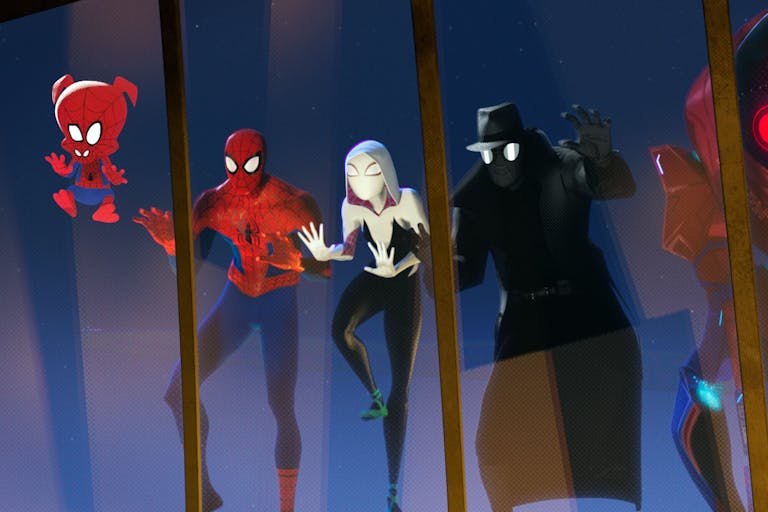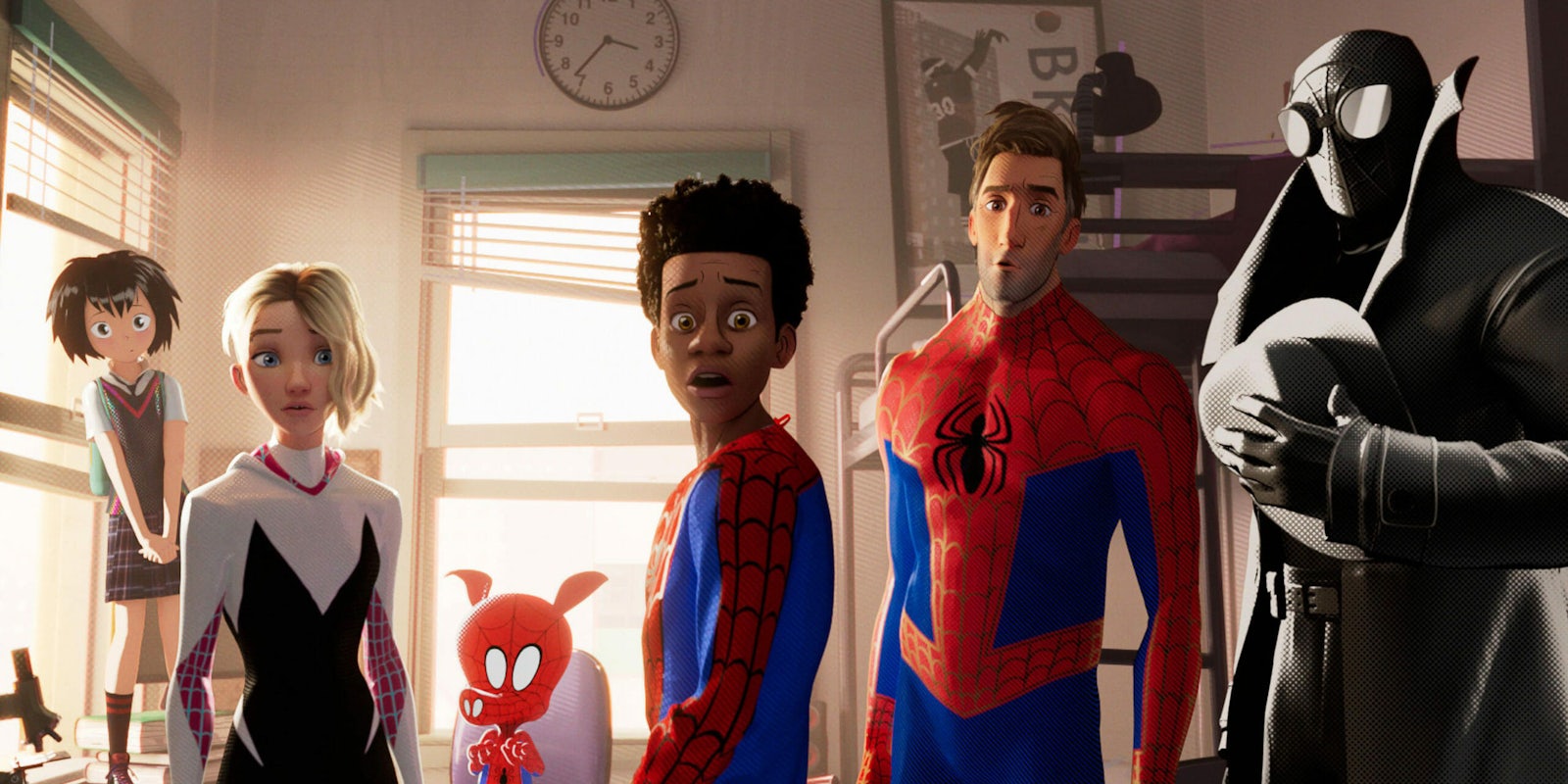Initially, Spider-Man: Into the Spider-Verse sounded like a hard sell. We’ve already seen three new Spider-Man franchises in recent memory, and animated movies are usually a straight-to-DVD operation for Marvel and DC. But Spider-Verse blew those expectations out of the water, and by the time its preview screenings wrapped up last week, it was already tipped for an Oscar. It’s easily one of the best superhero films of the past few years, standing alongside Black Panther in terms of visual imagination and joyfully innovative use of the source material.

DIRECTOR: Bob Persichetti, Peter Ramsay, Rodney Rothman
Spidey dazzles in this imaginative, bold, refreshing spin on the genre.
Directed by Bob Persichetti, Peter Ramsay, and Rodney Rothman, it’s a fresh and funny new take on Spidey’s origin story, focusing on Miles Morales (Shameik Moore) with a supporting cast of Spider-people like Peter Parker and Gwen Stacy (aka Spider-Woman). Miles arrived in the comics in 2011, an Afro-Latino New York teen who gained spider powers like Peter Parker. The movie brings him to a wider audience, introducing him as a dorky kid who just started at an intimidating new charter school, worrying about making friends and meeting his dad’s high expectations.

It’s amazing how much Into the Spider-Verse fits into its two-hour runtime. Overlapping with our intro to Miles’ life, the main story revolves around a rift in the multiverse, causing a squad of Spider-characters to appear from parallel dimensions. This gives Miles a dubious new mentor in the form of Peter B. Parker (Jake Johnson), a down-on-his-luck version of the original Spider-Man, portrayed as a goofy disaster who has already been a superhero for 22 years. They’re joined by the teenage Gwen (Hailee Steinfeld) and three comedy Spidey variants: a cartoon pig voiced by John Mulaney, a 1930s noir antihero (Nic Cage), and a mecha anime girl (Kimiko Glenn). Each one uses a different animation technique (noir Spidey exists in monochrome while “Spider-Ham” plays by Looney Tunes rules), building on the film’s innovative visual style.
To audiences familiar with the ubiquitous Disney/Pixar animation aesthetic, Into the Spider-Verse is revolutionary. Combining CG and hand-drawn animation, it hammers home a point that most superhero movies ignore: Comic books are a visual medium. Even with films like Doctor Strange and Guardians of the Galaxy, which lean into their trippy source material, live-action superhero movies rarely reflect the visual impact of the comics. The last truly great example is Tim Burton’s theatrically stylized Batman, but for the most part, we see actors wearing “realistic” costumes fighting “realistic” enemies in some approximation of the real world. You rarely see anything interesting happening with cinematography or production design, never mind the quick-witted, psychedelically colorful action sequences of Into the Spider-Verse.

Live-action filmmakers often seem worried about making their CGI monsters too extreme or their superpowers too weird. In an animated movie, there are no such concerns. Viewers find it easier to suspend their disbelief with a cartoon, which allows for more artistic leeway. So in Spider-Verse, the Green Goblin isn’t a guy in a mask, he’s a monster the size of a four-story building. Kingpin isn’t just a big dude, he’s wider than his own car. Miles’ internal monologue appears on-screen in speech bubbles, and we see visual representations of his spider-senses like scribbles on a page. The end product is a masterpiece of visual storytelling, with a snappy screenplay to match. Even the exposition scenes are natural and fun, as characters deliver Cliffs notes origin stories before launching back into the action.
Following the trend for genre-savvy humor in films like Deadpool and Guardians of the Galaxy, it’s interesting to see Into the Spider-Verse be self-referential without being smug. It feels fresh and rooted in contemporary culture, yet most of its references are for music and movies that don’t actually exist in our universe. It caters to inclusive enjoyment instead of exclusive geek trivia knowledge. As for the ensemble cast of Spider-people, no Marvel knowledge is necessary. Each one gets a clear and concise intro, and Peter Parker is both a familiar amalgam of previous versions and an entirely new take on the character. It makes for a refreshingly standalone kind of story, rooted in Miles’ life. And plenty of fans will happily accept this as the definitive Miles because to be brutally honest, the comics version never felt as authentic and well-rounded as he does here.
Released next week, DC’s Aquaman offers a helpful point of comparison to Spider-Verse‘s character-focused storytelling. Enjoyable but formulaic, Aquaman is packed with overlong action sequences and offers a fraction of the characterization we see in Miles and his friends. Aquaman doesn’t seem to have a home or a social circle other than his father, because this kind of detail isn’t relevant to the plot of retrieving a magical trident. Miles, on the other hand, has a rich background in New York. We know his music taste and hobbies, and explore the subtle family conflict between Miles’ police officer dad (Brian Tyree Henry) and charming ne’er-do-well uncle Aaron (Mahershala Ali). We understand the comfort of Miles’ home, where he switches between Spanish and English with his mom, and the tension of his new school, where the other students seem terrifyingly confident and judgemental.
Basically, we learn more about Miles in the first few minutes of Spider-Verse than we do about Henry Cavill’s Superman over three entire movies. It’s both an argument in favor of more diverse and culturally specific representation, and against the concept of generic everyman heroes. Instead of relying on tired tropes to fill in the gaps, Into the Spider-Verse gives us everything we need to love and understand Miles: A satisfyingly personal story, embedded in a uniquely energetic visual experience.

